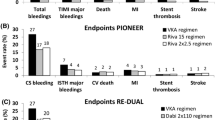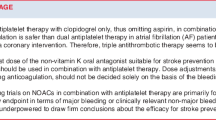Abstract
Triple antithrombotic therapy (TAT), consisting of aspirin, a P2Y12 receptor antagonist and oral anticoagulant (OAC) medication has been considered as an ‘unavoidable’ strategy for a 1–12 months for atrial fibrillation (AF) patients post acute coronary syndrome or percutaneous coronary angioplasty with stenting. However, TAT has rather poorly been adopted in real life practice, mainly because of an accompanying increased bleeding potential and lack of definitive results of randomized clinical trials. Several registries, meta-analyses and small randomized trials have so far provided the base of guidelines recommendations. Furthermore, in the recently published Open-Label, Randomized, Controlled, Multicenter Study Exploring Two Treatment Strategies of Rivaroxaban and a Dose-Adjusted Oral Vitamin K Antagonist Treatment Strategy in Subjects with Atrial Fibrillation who Undergo Percutaneous Coronary Intervention (PIONEER AF-PCI) trial involving 2124 patients, the primary safety endpoint of clinically significant bleeding was significantly reduced in the rivaroxaban low dose (15 mg daily) plus single P2Y12 receptor antagonist arm compared to TAT, with no difference in the secondary efficacy endpoint. Despite several limitations of the PIONEER AF-PCI trial, it appears that among patients who omit aspirin, there may be equivalent ischemic protection with dual therapy and no disadvantage for additional risk of thrombotic events.

Similar content being viewed by others
References
Go AS, Hylek EM, Phillips KA, et al. Prevalence of diagnosed atrial fibrillation in adults: national implications for rhythm management and stroke prevention: the AnTicoagulation and risk factors in atrial fibrillation (ATRIA) study. JAMA. 2001;285:2370–5.
Lip GY, Frison L, Halperin JL, Lane DA. Identifying patients at high risk for stroke despite anticoagulation: a comparison of contemporary stroke risk stratification schemes in an anticoagulated atrial fibrillation cohort. Stroke. 2010;41:2731–8.
Rubboli A, Colletta M, Valencia J, et al. WARfarin and coronary STENTing (WAR-STENT) study group. Periprocedural management and in-hospital outcome of patients with indication for oral anticoagulation undergoing coronary artery stenting. J Interv Cardiol. 2009;22:390–7.
Leon MB, Baim DS, Popma JJ, et al. A clinical trial comparing three antithrombotic-drug regimens after coronary-artery stenting.Stent anticoagulation restenosis study investigators. N Engl J Med. 1998;339:1665–71.
Connolly S, Pogue J, Hart R, et al. Clopidogrel plus aspirin versus oral anticoagulation for atrial fibrillation in the atrial fibrillation Clopidogrel trial with Irbesartan for prevention of vascular events (ACTIVE W): a randomised controlled trial. Lancet. 2006;367:1903–12.
Camm AJ, Kirchhof P, Lip GY, et al. Guidelines for the Management of Atrial Fibrillation: the Task Force for the management of atrial fibrillation of the European Society of Cardiology (ESC). Europace. 2010;12:1360–420.
Rohla M, Weiss TW, Wojta J, Niessner A, Huber K. Double or triple antithrombotic combination therapy in patients who need anticoagulation and antiplatelet therapy in parallel. Eur Heart J Cardiovasc Pharmacother. 2015;1:191–7.
Lamberts M, Olesen JB, Ruwald MH, et al. Bleeding after initiation of multiple antithrombotic drugs, including triple therapy, in atrial fibrillation patients following myocardial infarction and coronary intervention: a nationwide cohort study. Circulation. 2012;126:1185–93.
Eikelboom JW, Mehta SR, Anand SS, Xie C, Fox KA, Yusuf S. Adverse impact of bleeding on prognosis in patients with acute coronary syndromes. Circulation. 2006;114:774–82.
Doyle BJ, Rihal CS, Gastineau DA, Holmes DR Jr. Bleeding, blood transfusion, and increased mortality after percutaneous coronary intervention: implications for contemporary practice. J Am Coll Cardiol. 2009;53:2019–27.
Kwok CS, Khan MA, Rao SV, et al. Access and non-access site bleeding after percutaneous coronary intervention and risk of subsequent mortality and major adverse cardiovascular events: systematic review and meta-analysis. Circ Cardiovasc Interv. 2015;8
Hansen ML, Sørensen R, Clausen MT, et al. Risk of bleeding with single, dual, or triple therapy with warfarin, aspirin, and clopidogrel in patients with atrial fibrillation. Arch Intern Med. 2010;170:1433–41.
Wang TY, Robinson LA, Ou FS, et al. Discharge antithrombotic strategies among patients with acute coronary syndrome previously on warfarin anticoagulation: physician practice in the CRUSADE registry. Am Heart J. 2008;155:361–8.
Lopes RD, Rao M, Simon DN, et al. Triple vs dual AntithromboticTherapy in patients with atrial fibrillation and coronary artery disease. Am J Med. 2016;129:592–9.
Dewilde WJ, Janssen PW, Verheugt FW, et al. Triple therapy for atrial fibrillation and percutaneous coronary intervention: a contemporary review. J Am Coll Cardiol. 2014;64:1270–80.
Gibson CM, Mehran R, Bode C, et al. Prevention of bleeding in patients with atrial fibrillation undergoing PCI. N Engl J Med. 2016;375:2423–34.
Dewilde WJ, Oirbans T, Verheugt FW, et al. Use of clopidogrel with or without aspirin in patients taking oral anticoagulant therapy and undergoing percutaneous coronary intervention: an open-label, randomised, controlled trial. Lancet. 2013;381:1107–15.
Fiedler KA, Maeng M, Mehilli J, et al. Duration of triple therapy in patients requiring oral anticoagulation after drug-eluting stent implantation: the ISAR-TRIPLE trial. J Am Coll Cardiol. 2015;65:1619–29.
Rubboli A, Schlitt A, Kiviniemi T, et al. One-year outcome of patients with atrial fibrillation undergoing coronary artery stenting: an analysis of the AFCAS registry. Clin Cardiol. 2014;37:357–64.
Koskinas KC, Räber L, Zanchin T, et al. Duration of triple antithrombotic therapy and outcomes among patients undergoing percutaneous coronary intervention. JACC Cardiovasc Interv. 2016;9:1473–83.
Sra S, Tan MK, Mehta SR, et al. Ischemic and bleeding events in patients with myocardial infarction undergoing percutaneous coronary intervention who require oral anticoagulation: insights from the Canadian observational AntiPlateletsTudy. Am Heart J. 2016;180:82–9.
D’Ascenzo F, Taha S, Moretti C, et al. Meta-analysis of randomized controlled trials and adjusted observational results of use of clopidogrel, aspirin, and oral anticoagulants in patients undergoing percutaneous coronary intervention. Am J Cardiol. 2015;115:1185–93.
Gao XF, Chen Y, Fan ZG, et al. Antithrombotic regimens for patients taking oral anticoagulation after coronary intervention: a meta-analysis of 16 clinical trials and 9,185 patients. Clin Cardiol. 2015;38:499–509.
Barbieri L, Verdoia M, Schaffer A, Suryapranata H, De Luca G. Risk and benefits of TripleTherapy in patients undergoing coronary stent implantation requiring oral anticoagulation: a meta-analysis of 16 studies. Cardiovasc Drugs Ther. 2016;30:611–22.
Cao Y, Tian XY, Zhang R, et al. Short- and long-term efficacy and safety of triple vs. dual antithrombotictherapy in patients with drug-eluting stent implantation and an indication for oral anticoagulation: a meta-analysis. Int J Clin Pharmacol Ther. 2016;54:950–65.
Liu J, Fan M, Zhao J, et al. Efficacy and safety of antithrombotic regimens after coronary intervention in patients on oral anticoagulation: traditional and Bayesian meta-analyses of clinical trials. Int J Cardiol. 2016;205:89–96.
Dans AL, Connolly SJ, Wallentin L, et al. Concomitant use of antiplatelet therapy with dabigatran or warfarin in the randomized evaluation of long-term anticoagulation therapy (RE-LY) trial. Circulation. 2013;127:634–40.
Sherwood MW, Cyr DD, Jones WS, et al. Use of dual antiplatelet therapy and patient outcomes in those undergoing percutaneous coronary intervention: the ROCKETAF trial. JACC Cardiovasc Interv. 2016;9:1694–702.
Mega JL, Braunwald E, Wiviott SD, et al. ATLAS ACS 2–TIMI 51 investigators. Rivaroxaban in patients with a recent acute coronary syndrome. N Engl J Med. 2012;366:9–19.
Anderson JL, Adams CD, Antman EM, et al. ACC/AHA 2007 guidelines for the management of patients with unstable angina/non ST-elevation myocardial infarction: a report of the American College of Cardiology/American Heart Association Task Force on Practice Guidelines (Writing Committee to Revise the 2002 Guidelines for the Management of Patients With Unstable Angina/Non ST-Elevation Myocardial Infarction): developed in collaboration with the American College of Emergency Physicians, the Society for Cardiovascular Angiography and Interventions, and the Society of Thoracic Surgeons: endorsed by the American Association of Cardiovascular and Pulmonary Rehabilitation and the Society for Academic Emergency Medicine. Circulation. 2007;116:148–304.
Windecker S, Kolh P, Alfonso F, et al. 2014 ESC/EACTS guidelines on myocardial revascularization: the Task Force on myocardial revascularization of the European Society of Cardiology (ESC) and the European Association for Cardio-Thoracic Surgery (EACTS) developed with the special contribution of the European Association of Percutaneous Cardiovascular Interventions (EAPCI). Eur Heart J. 2014;35:2541–619.
Kirchhof P, Benussi S, Kotecha D, et al. 2016 ESC guidelines for the management of atrial fibrillation developed in collaboration with EACTS. Eur Heart J. 2016;37:2893–962.
Macle L, Cairns J, Leblanc K, et al. 2016 focused update of the Canadian cardiovascular Society guidelines for the Management of Atrial Fibrillation. Can J Cardiol. 2016;32:1170–85.
Angiolillo DJ, Goodman SG, Bhatt DL, et al. Antithrombotic Therapy in Patients With Atrial Fibrillation Undergoing Percutaneous Coronary Intervention: A North American Perspective-2016 Update. Circ Cardiovasc Interv. 2016 Nov;9(11).
Gibson CM, Pinto DS, Chi G, et al. Recurrent hospitalization among patients with atrial fibrillation undergoing intracoronary stenting treated with two treatment strategies of rivaroxaban or a dose-adjusted oral vitamin k antagonist treatment strategy. Circulation. 2017;135:323–33.
Sambola A, Montoro JB, Del Blanco BG, et al. Dual antiplatelet therapy versus oral anticoagulation plus dual antiplatelet therapy in patients with atrial fibrillation and low-to-moderate thromboembolic risk undergoing coronary stenting: design of the MUSICA-2 randomized trial. Am Heart J. 2013;166:669–75.
Urban P, Meredith IT, Abizaid A, et al. Polymer-free drug-coated coronary stents in patients at high bleeding risk. N Engl J Med. 2015;373:2038–47.
Sarafoff N, Martischnig A, Wealer J, et al. Triple therapy with aspirin, prasugrel, and vitamin K antagonists in patients with drug-eluting stent implantation and an indication for oral anticoagulation. J Am Coll Cardiol. 2013;61:2060–6.
Jackson LR 2nd, Ju C, Zettler M, et al. Outcomes of patients with acute myocardial infarction undergoing percutaneous coronary intervention receiving an oral anticoagulant and dual antiplatelet therapy: a comparison of clopidogrel versus prasugrel from the TRANSLATE ACS study. JACC Cardiovasc Interv. 2015;8:1880–9.
Fu A, Singh K, Abunassar J, et al. Ticagrelor in triple antithrombotic therapy: predictors of ischemic and bleeding complications. Clin Cardiol. 2016;39:19–23.
Bhatt DL. O PIONEERs! - the beginning of the end of full dose triple therapy with warfarin? Circulation. 2017;135:334–7.
Author information
Authors and Affiliations
Corresponding author
Ethics declarations
Funding
There was no funding for this work.
Conflict of Interest
Dr. Alexopoulos has received advisory board fees from AstraZeneca, Boeringer Ingelheim, Bayer, The Medicines Company, Medtronic and speaker honoraria from AstraZeneca. Dr. Lekakis has received advisory board fees and lecturing honoraria from Astrazeneca, Actelion and MSD. Dr. Vlachakis has no conflict of interest.
Ethical Approval
This article does not contain any studies with human participants performed by any of the authors.
Informed Consent
Informed consent was obtained from all individual participants included in the study.
Rights and permissions
About this article
Cite this article
Alexopoulos, D., Vlachakis, P. & Lekakis, J. Triple Antithrombotic Therapy in Atrial Fibrillation Patients Undergoing PCI: a Fading Role. Cardiovasc Drugs Ther 31, 319–324 (2017). https://doi.org/10.1007/s10557-017-6730-5
Published:
Issue Date:
DOI: https://doi.org/10.1007/s10557-017-6730-5




